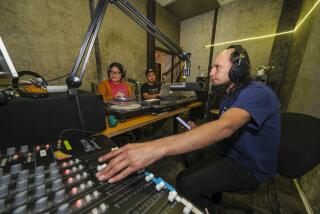Salvador Rebels Urge ‘Last Chance’ Talks
- Share via
SAN SALVADOR — El Salvador’s rebels Saturday proposed “a last opportunity” meeting with the government Tuesday and Wednesday to negotiate a peace settlement and called on the United States to end its opposition to postponing a presidential election to Sept. 15.
Noting that the government had never responded to a previous guerrilla offer to meet this weekend, Radio Venceremos, the clandestine radio of the Farabundo Marti National Liberation Front, said that “finding ourselves at the end of opportune time we propose negotiations no later than March 7 and 8 in El Salvador.”
If the talks aren’t held and the voting is not delayed, said Salvador Samayoa, a senior FMLN spokesman in a separate interview, “there is no possibility of a negotiated solution for five years”--the period until the next presidential election.
President Jose Napoleon Duarte last Sunday had accepted the idea of a meeting with the FMLN, as the guerrillas are commonly called, for last Tuesday, in Guatemala, a plan rejected by the rebels, who said that the talks should be held here.
Limited Subject
Even if a meeting is held, the guerrillas’ demand that the subject be limited to the postponement of the voting from March 19 to Sept. 15 is not acceptable to Duarte, the Salvadoran armed forces and the Nationalist Republican Alliance, the far-rightist party that is the likely winner of the presidential voting and has unswervingly opposed any delay in the elections.
Duarte, who cannot succeed himself and whose Christian Democratic Party is trailing badly in opinion polls, has said the election could be set back to April 30, but neither Arena, as the right-wing party is called, nor the FMLN accepted that proposal.
The latest guerrilla initiative is in line with a continuing effort to avoid being labeled as the party that wrecked an opportunity to end the fighting that has claimed at least 45,000 lives in nine years.
A European diplomat said that a senior rebel leader had told him that the rebels were engaging in a “stunt” from the beginning. And, in fact, the FMLN’s motives have been viewed with cynicism since they opened the current “peace process” Jan. 23 with a proposal to participate in and accept the outcome of the election, if the balloting was put off until Sept. 15.
Nevertheless, the FMLN has refused to let the initiative die with the government’s having the last word.
The diplomat said that contacts have already been made between Arena and the FMLN to hold talks after the election and that Arena has considered offering government positions to political allies of the rebels, either to improve the atmosphere or divide the left.
Saturday’s rebel proposal for another meeting date was made against the backdrop of ambiguous statements by rebel spokesman Samayoa in Mexico City, who said that he had given up all but the slightest hope for a postponement.
He said that even if the voting goes ahead March 19 as now scheduled, the rebels will not violently disrupt it unless there are “very exceptional conditions.” Such “conditions” presumably would include a government effort to impede the campaign of the Democratic Convergence, a coalition of leftist parties allied with the FMLN that is running in the election.
On the other hand, Radio Venceremos urged its listeners to boycott the voting or cast invalid ballots because “the election of March 19 will only aggravate hunger and misery, as it holds out no hope of a real solution.”
Samayoa accused the United States of manipulating President Duarte and the Arena party to try to make the FMLN appear to be the villain despite what he said were determined FMLN efforts to be conciliatory. “We have reduced to almost zero the rhetoric and public confrontation with the United States,” he said. “We understood this as a clear signal that we were looking for an understanding.”
That was an apparent reference to the distribution of key rebel proposals to officials and politicians in Washington for comment before they were publicly disclosed.
“The United States was worried because the FMLN had too much political initiative in El Salvador and internationally,” Samayoa said. “They are trying to neutralize this support and political initiative.”
He rejected the notion that talks could be restarted after the election. “What would talks continue for? So that we accept the government and hand over our arms? That is not going to happen.”
However, he acknowledged that during the Feb. 21 discussions in Mexico, “Arena began talking about dialogue” after the election.
Kenneth Freed reported from San Salvador and Marjorie Miller from Mexico City.
More to Read
Sign up for Essential California
The most important California stories and recommendations in your inbox every morning.
You may occasionally receive promotional content from the Los Angeles Times.













